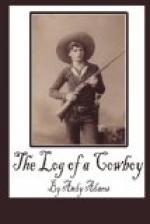“His capacity, however, was limited. About two o’clock Doc Langford and two of his peelers were seen riding up. When he came into the kitchen, Doc swore by all that was good and holy that he hadn’t heard that our artist had come back to that country. But any one that was noticing could see him edge around to the tub. It was easy to see that he was lying. This luck of ours was circulating faster than a secret amongst women. Our man, though, stood at his post like the boy on the burning deck. When night came on, he hadn’t covered the bottom of the tub. When he knocked off, Doc Langford and his men gobbled up what was left. We gave them a mean look as they rode off, but they came back the next day, five strong. Our regular men around camp didn’t like it, the way things were going. They tried to act polite to”—
“Calling bear sign doughnuts,” interrupted Quince Forrest, “reminds me what”—
“Will you kindly hobble your lip,” said Officer; “I have the floor at present. As I was saying, they tried to act polite to company that way, but we hadn’t got a smell the second day. Our man showed no signs of fatigue, and told several good stories that night. He was tough. The next day was Christmas, but he had no respect for a holiday, and made up a large batch of dough before breakfast. It was a good thing he did, for early that morning ‘Original’ John Smith and four of his peelers rode in from the west, their horses all covered with frost. They must have started at daybreak—it was a good twenty-two mile ride. They wanted us to believe that they had simply come over to spend Christmas with us. Company that way, you can’t say anything. But the easy manner in which they gravitated around that tub—not even waiting to be invited—told a different tale. They were not nearly satisfied by noon.
“Then who should come drifting in as we were sitting down to dinner, but Billy Dunlap and Jim Hale from Quinlin’s camp, thirty miles south on the Cimarron. Dunlap always holed up like a bear in the winter, and several of the boys spilled their coffee at sight of him. He put up a thin excuse just like the rest. Any one could see through it. But there it was again—he was company. Lots of us had eaten at his camp and complained of his chuck; therefore, we were nice to him. Miller called our man out behind the kitchen and told him to knock off if he wanted to. But he wouldn’t do it. He was clean strain—I’m not talking. Dunlap ate hardly any dinner, we noticed, and the very first batch of bear sign turned out, he loads up a tin plate and goes out and sits behind the storehouse in the sun, all alone in his glory. He satisfied himself out of the tub after that.




